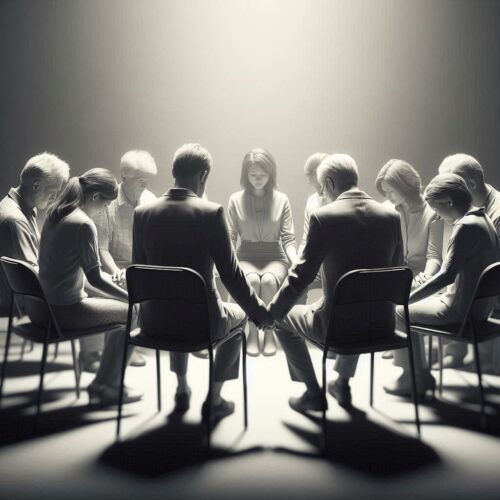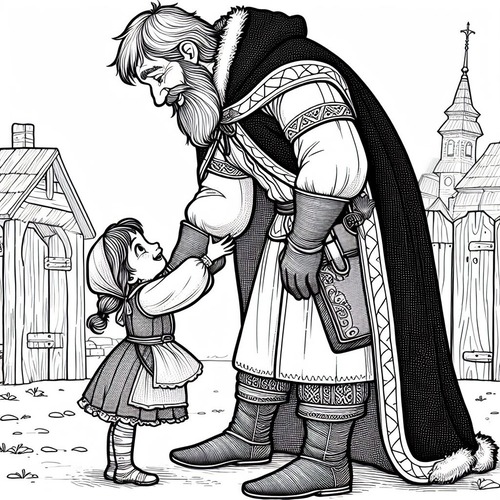A Royal Priesthood: Why Does Peter Address Believers Thus?
The Apostle Peter’s words in 1 Peter 2:9 are striking: they include one of the most profound declarations of Christian identity in all of Scripture. Writing to scattered believers facing trials and persecution in the first century, Peter reaches back to the language of Exodus and applies it directly to the church. This wasn’t mere poetic language—it was a revolutionary statement about the believer’s true identity in Christ.
Today, we tend to read over these familiar words without grasping their radical implications. What does it truly mean to be part of a “royal priesthood”? How should this identity shape our understanding of our relationship with God and our mission in the world? Join us as we explore the biblical foundation, theological significance, and practical implications of our identity as royal priests.
THE BIBLICAL FOUNDATION OF ROYAL PRIESTHOOD
The concept of God’s people as a priesthood didn’t originate with Peter. It traces back to God’s declaration to Israel on Mount Sinai (Exodus 19:5-6). The promise, however, remained largely unfulfilled in Israel’s history. The formal priesthood was restricted to Aaron’s descendants, while the rest of Israel never fully realised this priestly calling due to sin and covenant unfaithfulness.
The New Testament reveals how Christ fulfilled and transformed this promise. Notice the transition from Old Covenant to New in 1 Peter 2:4-10.
This priesthood isn’t limited to the church age but extends into eternity. John emphasises this identity in Revelation 1:5-6.
UNDERSTANDING PRIESTHOOD IN SCRIPTURE
To grasp what it means to be royal priests, we must understand the biblical concept of priesthood. In the Old Testament, priests served several crucial functions:
- They represented the people before God, approaching His presence on their behalf
- They represented God to the people, teaching His law and declaring His will
- They offered sacrifices to atone for sin and maintain covenant relationship
Christ perfectly fulfilled each of these roles as our Great High Priest (Hebrews 4:14-16). Unlike the Levitical priests who offered repeated sacrifices, Christ offered Himself once for all (Hebrews 7:27). And while the old priests died and could not continue in office, Christ “holds his priesthood permanently, because he continues forever” (Hebrews 7:24). His priestly work continues through His ongoing intercession for us (Hebrews 7:25).
THE “ROYAL” ASPECT: PARTICIPATING IN CHRIST’S KINGSHIP
The term “royal priesthood” combines two offices that were carefully separated in Israel’s history. Kings who attempted priestly functions (remember Saul and Uzziah?) were severely judged. Yet in Christ, these offices are perfectly united.
Psalm 110, the most quoted psalm in the New Testament, prophesied: “The LORD has sworn and will not change his mind, ‘You are a priest forever after the order of Melchizedek.’” This mysterious figure from Genesis 14 was both king of Salem and priest of God Most High—a foreshadowing of Christ’s dual office.
Hebrews 7 explains how Christ fulfils this prophecy as our Melchizedekian priest-king. Through our union with Christ, we participate in His royal authority. As Paul writes in Ephesians 2:6, God has “raised us up with him and seated us with him in the heavenly places in Christ Jesus.”
This participation exists in the “already/not-yet” tension of New Testament eschatology. We’re already royal priests in our position before God, yet we await the full manifestation of this reality when Christ returns and we reign with Him (2 Timothy 2:12, Revelation 20:6).
THE PRACTICAL IMPLICATIONS OF BEING ROYAL PRIESTS
Our identity as royal priests carries practical implications:
Direct Access to God: Perhaps the most revolutionary implication is our direct access to God through Christ. The temple veil has been torn (Matthew 27:51), and we now “have confidence to enter the holy places by the blood of Jesus” (Hebrews 10:19). In the Old Covenant, approaching God’s presence uninvited meant death. In Christ, we’re invited to “draw near with a true heart in full assurance of faith” (Hebrews 10:22). This privilege would have been unthinkable to Old Testament believers.
The Priesthood of All Believers: The doctrine doesn’t mean every believer should be a pastor or that church authority structures are unnecessary. Rather, it means every believer has direct access to God and a meaningful ministry within the body of Christ. The Reformation recovered this truth after centuries of clericalism had created an artificial divide between clergy and laity. Scripture teaches all believers are ministers, though we serve in different capacities according to our gifts (1 Corinthians 12:4-7).
Our Priestly Responsibilities: As royal priests, we have specific responsibilities:
- Offering spiritual sacrifices: “Present your bodies as a living sacrifice, holy and acceptable to God, which is your spiritual worship” (Romans 12:1). Our sacrifices also include “a sacrifice of praise” (Hebrews 13:15) and “to do good and to share what you have” (Hebrews 13:16).
- Intercession for others: We’re called to offer “supplications, prayers, intercessions, and thanksgivings…for all people” (1 Timothy 2:1), participating in Christ’s own intercessory ministry.
- Proclaiming God’s excellencies: 1 Peter 2:9 says we’re chosen specifically to “proclaim the excellencies of him who called you out of darkness into his marvellous light.” This priestly declaration bridges the gap between God and humanity.
- Ministering God’s grace: “As each has received a gift, use it to serve one another, as good stewards of God’s varied grace… by the strength that God supplies—in order that in everything God may be glorified through Jesus Christ” (1 Peter 4:10-11).
CONCLUSION
The truth of the believer’s royal priesthood is one of Scripture’s most profound revelations. In Christ, we’ve become what Israel was always meant to be—a kingdom of priests mediating God’s presence to the world. The identity isn’t earned but received through faith alone, granting us direct access to God, meaningful participation in His kingdom work, and the privilege of offering spiritual sacrifices. As royal priests, we live in the tension of already having this status while awaiting its full expression when Christ returns.
May this identity shape how we approach worship, community, suffering, and our daily ministry in a broken world—remembering always our priesthood rests not on our worthiness but on Christ’s perfect priesthood imputed to us by sovereign grace.
A ROYAL PRIESTHOOD—RELATED FAQs
How does covenant theology show the believer’s priesthood isn’t an accident or afterthought in God’s plan? Covenant theology reveals our priesthood was planned from eternity past as part of God’s unchangeable decree. The progression from Adam as vice-regent in Eden through Abraham’s promised blessing to the nations, Israel’s designation as a “kingdom of priests,” and finally Christ’s perfect fulfillment shows an intentional divine pattern. Our royal priesthood is the outworking of God’s eternal purpose established before creation, demonstrating His sovereignty in all aspects of redemptive history.
- Does ‘royal priesthood’ mean individual autonomy? No, our royal priesthood is fundamentally corporate rather than individualistic. Scripture consistently portrays believers as “living stones” being built together into a spiritual house (1 Peter 2:5), emphasising our interconnected nature. While each believer has direct access to God through Christ, we’re called to exercise our priestly functions within the covenant community, submitting to one another out of reverence for Christ. Our priesthood flourishes within the accountability and wisdom of the body, not in isolation.
- Does the believer’s priesthood eliminate the need for church leadership? Absolutely not. The priesthood of all believers coexists with God’s appointment of specific leaders within the church. Ephesians 4:11-12 shows Christ gives “shepherds and teachers” to equip the saints for ministry, not to render them unnecessary. Hebrews 13:17 commands believers to obey their leaders and submit to them as those who keep watch over souls. Our universal priesthood enhances rather than eliminates the effectiveness of God-ordained leadership roles.
What earthly benefits does the believer’s priesthood provide? Our royal priesthood provides profound earthly benefits while challenging worldly notions of “benefit.” We receive direct access to God in prayer without human mediators, the dignity of meaningful service regardless of social position, and participation in Christ’s ongoing ministry through the Spirit. We experience the joy of representing Christ to others through word and deed, and find purpose in offering spiritual sacrifices of praise and good works that glorify God. These benefits transcend material prosperity—but bring deep fulfillment.
- How do we balance our “royal” identity with Christ’s call to servanthood? Our royal identity and servanthood aren’t contradictory but complementary, modelled perfectly in Christ Himself. Jesus demonstrated true kingship expresses itself through sacrificial service, washing His disciples’ feet and giving His life as a ransom. We exercise our royal authority primarily through humble service, knowing that in God’s kingdom, the path to exaltation comes through humility. The more we embrace Christ-like servanthood now, the more fully we will participate in His reign later.
- How do we offer “spiritual sacrifices” in practical terms? Spiritual sacrifices include offering our bodies as living sacrifices (Romans 12:1), giving praise and thanksgiving (Hebrews 13:15), sharing our resources generously (Hebrews 13:16), and participating in gospel proclamation (Romans 15:16). Practically, this means dedicating our daily work to God as worship, speaking words that honour Him, giving sacrificially to those in need, and sharing the good news with others. Even our sufferings can become spiritual sacrifices when endured with faith and offered back to God.
How does our priestly identity influence our approach to creation and culture? As royal priests, we stand between God and creation, representing Him to the world and bringing the world’s concerns before Him. This calling goes beyond evangelism to include cultural stewardship—caring for creation, pursuing justice, creating beauty, and developing culture in ways that reflect God’s character. We interpret reality through a theological lens, recognizing God’s common grace in human achievement while prophetically challenging idolatry. Our priesthood thus extends to every legitimate sphere of human activity.
- Can women fully participate in the royal priesthood? Yes, all believers—regardless of gender—equally share in the royal priesthood. Peter makes no distinction when addressing the “royal priesthood” (1 Peter 2:9), and Paul affirms that in Christ “there is neither male nor female” regarding our position before God (Galatians 3:28). While the church may have different roles in its ordered ministry, the spiritual priesthood belongs equally to all who’re in Christ. Women and men alike offer spiritual sacrifices, intercede for others, proclaim God’s excellencies, and minister His grace.
- How does our priestly identity shape our response to suffering? Our identity as royal priests transforms our understanding of suffering by connecting it to Christ’s priestly work. As priests who follow a suffering High Priest, we recognize that suffering often becomes the context for our most effective ministry. Through suffering, we participate in Christ’s sufferings (1 Peter 4:13), offer sacrifices of faith when circumstances seem darkest, and demonstrate the reality of God’s sustaining grace. Our priesthood assures us that suffering is never meaningless but is being worked for God’s glory and our good.
How do we nurture our priestly identity in a secular culture? We nurture our priestly identity through regular engagement with Scripture, which illuminates our status in Christ, and through participation in the sacraments, which visibly confirm our covenant relationship. Corporate worship reminds us we’re part of a “royal priesthood” larger than ourselves. Daily prayer practices help us embrace our mediatorial role between God and the world. Intentional community with fellow believers reinforces our identity against secular pressure. Regular confession of sin keeps us mindful of our need for Christ’s perfect priesthood on which our own priesthood depends.
A ROYAL PRIESTHOOD—OUR RELATED POSTS
Editor's Pick

The Throne-Room Vision: Who Did Isaiah See?
The scene is unforgettable: Isaiah stands in the temple, and suddenly the veil between heaven and earth tears open. He [...]

The Angel of the Lord: Can We Be Certain It Was Christ All Along?
Throughout the Old Testament, a mysterious figure appears: the Angel of the LORD. He speaks as God, bears God’s name, [...]
SUPPORT US:
Feel the Holy Spirit's gentle nudge to partner with us?
Donate Online:
Account Name: TRUTHS TO DIE FOR FOUNDATION
Account Number: 10243565459
Bank IFSC: IDFB0043391
Bank Name: IDFC FIRST BANK






